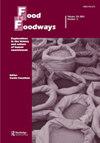白色垃圾烹饪:“爆炸”食谱
IF 1.1
Q2 ANTHROPOLOGY
引用次数: 0
摘要
摘要欧内斯特·米克勒(Ernest Mickler)的《白色垃圾烹饪》(White Trash Cooking。米克勒的书显然讽刺了烹饪书对礼貌规范、生活方式渴望和良好家务的重视。它的讽刺与米克勒的兴趣和经历以及雅贡出版社对米克勒收集的材料的研究结合在一起(尽管相当尴尬)。然而,米克勒的《白色垃圾烹饪》作品的历史引起了人们对烹饪书流派不同的、未被承认的维度的关注,尤其是它构建社区的方法。米克勒的书回顾了社区烹饪书的亚流派,但他对“白色垃圾”的定义以及这种社区与内容之间的关系都是粗略和不确定的。米克勒声称,他的书为烹饪书提供了一种新的烹饪方式,但理由不多。本文考察了《白色垃圾烹饪》的构成及其背景,以重读米克勒的作品,并将《白色垃圾厨房》与当时的其他烹饪书进行了比较,重新思考了烹饪书的类型。本文章由计算机程序翻译,如有差异,请以英文原文为准。
White Trash Cooking: ‘exploding’ the cookbook
Abstract Ernest Mickler’s White Trash Cooking, with its focus on a disparaged population, its addition of a collection of documentary photographs alongside the recipes, and the camp hilarity of its authorial voice, has long been judged to transgress, shatter or even explode the generic conventions of the cookbook. Mickler’s book clearly does satirize the seriousness of cookbooks’ attention to polite norms, lifestyle aspirations and good housekeeping. Its satire is combined (albeit rather awkwardly) with a range of high cultural references deriving from Mickler’s interests and experiences as well as the work of the Jargon Press on the material Mickler had collected. However, the history of Mickler’s composition of White Trash Cooking draws attention to different, unacknowledged dimensions of the cookbook genre, and in particular to the methodology through which it constructs community. Mickler’s book recalls the sub-genre of community cookbook, but both his definition of ‘white trash’ and the relationship between such a community and the contents are sketchy and uncertain. Mickler asserts that his book presents a cuisine new to the cookbook, but with small justification. This essay examines White Trash Cooking’s composition and its context to re-read Mickler’s work, and uses comparison between White Trash Cooking and other cookbooks of its day to think afresh about the cookbook genre.
求助全文
通过发布文献求助,成功后即可免费获取论文全文。
去求助
来源期刊

Food and Foodways
ANTHROPOLOGY-
CiteScore
2.20
自引率
0.00%
发文量
16
期刊介绍:
Food and Foodways is a refereed, interdisciplinary, and international journal devoted to publishing original scholarly articles on the history and culture of human nourishment. By reflecting on the role food plays in human relations, this unique journal explores the powerful but often subtle ways in which food has shaped, and shapes, our lives socially, economically, politically, mentally, nutritionally, and morally. Because food is a pervasive social phenomenon, it cannot be approached by any one discipline. We encourage articles that engage dialogue, debate, and exchange across disciplines.
 求助内容:
求助内容: 应助结果提醒方式:
应助结果提醒方式:


